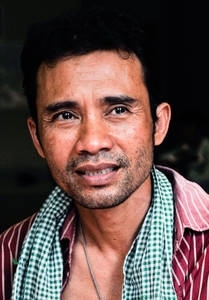 |
| Arn Chorn-Pond (cambodianlivingarts.com) |
Death. Watching hundreds of people die every day takes a hefty toll on the human soul. Living a life where famine was widespread and collapsing from fatigue meant certain death. Not because fatigue itself caused death, but people were shot on sight for collapsing on the ground. But a small boy, only twelve years old at that time, was one of the lucky ones that lived to tell the tale. Arn Chorn-Pond, born in 1966, was only a child when the Khmer Rouge, a radical group of communists who believed that only an agricultural lifestyle would remove all corruption in Cambodia, came into power. They fulfilled their belief by executing all teachers, doctors, musicians, and almost every educated adult living in Cambodia, eventually slaughtering about 1.5 to 1.7 million people. Arn Chorn-Pond was forced to work in the fields for tireless hours for several months until the Vietnamese invaded Cambodia, causing Pond to become a child soldier. Eventually he escaped Cambodia and traveled to the United States of America with his adoptive father, Peter L. Pond. When Pond attended school in Cambodia his classmates teased him for his skin color and ethnicity. Eventually his adoptive father requested that he reveal his story to the outside world so that everyone could learn about the inhumane acts of the Khmer Rouge. From that day on Arn Chorn-Pond began to give speeches about the suffering in Cambodia and continues to inspire people throughout the world. Arn Chorn-Pond founded several organizations including the Cambodian Living Arts, an organization dedicated to restoring the classical music of Cambodia, and he cofounded Children of War, an organization that helps young children affected by the byproducts of war. Arn Chorn-Pond throughout his childhood saved several other children from starvation, and even saved the life of an adult named Yoeun Mek, who later taught Pond how to play the flute. Pond was one of a couple children selected to entertain the Khmer Rouge with music. However, more than half of those children were executed for showing inadequate knowledge of the various Cambodian instruments. This knowledge of a musical instrument is the sole factor that prevented Pond from execution by the Khmer Rouge, and eventually led to a love of the musical arts. Arn Chorn-Pond is praiseworthy hero because of his selflessness towards others, his great passion for the musical arts, and his ability to admit his past mistakes and faults.
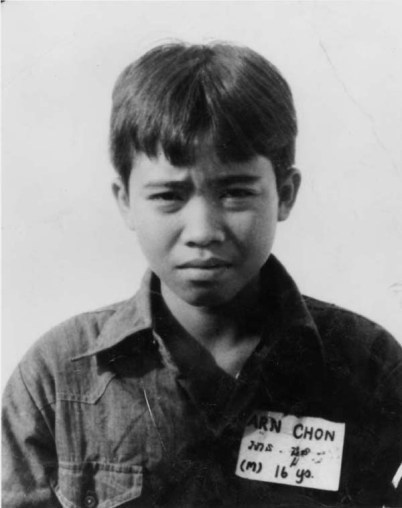 |
| Arn as a young boy ((patriciamccormick.com) |
Fear and death create desperation, the willingness to do anything to live. When Pond was a child, many children would betray each other to get even the slightest scrap of food. But Pond remained selfless and instead of prioritizing his own life, he put others in front of him, including his music teacher: "Arn met another music teacher, Yoeun Mek, who taught him the flute [when Arn was a child], and the two helped each other stay alive. 'I stole food for him,' Mr. Chorn-Pond said, although the penalty for such a crime was death" (Kahn). Prioritizing other humans over oneself is an extremely difficult task, as it is human nature to think selfishly rather than selflessly. Pond was fully aware the penalties for stealing food from the Khmer Rouge, as he witnessed hundreds of executions firsthand. Mek stated himself that after he witnessed the death of his own wife and daughter, he was practically dead himself. But Pond took the risk anyway, and it served him well, as Mek learned from Pond that he needed to stay alive for the sake of his students, who in turn needed him to teach them how to properly play various Cambodian instruments. By helping Mek, Pond was able to save the lives of several other children, Mek, and himself. Although the death of thousands of people around Pond changed who he was, it never affected his heroic character. When he grew older Pond continued to express his selflessness to the same man, Yoeun Mek: "When Mr. Yoeun met the Children of War group, he told them how Arn saved his life -- the first time he revealed that part of his past to anyone. Later the two played together. That was when Mr. Chorn-Pond got the idea for the Master Performers Program. ''Our project gave him a life,'' he said" (Hest). Pond found Mr. Yoeun drunk and barely hanging on to life the second time he met him. And yet again Pond decided to help a person in need but this time it was only for Mr. Yoeun and to revive the musical talents of Cambodia. Helping Mek did not personally benefit Pond,but he still acted from the kindness of his heart for the man that helped Pond in the past. Arn Chorn-Pond's character is what truly allowed him to survive the Khmer Rouge. If he did not risk his life in protecting Yoeun Mek, the children would have never been able to learn how to play the instruments properly, thus ending all of their lives. In the end Pond shows that it is quintessential to be selfless. Because Pond acted so selflessly he gave a new life to Yoeun Mek, which shows that selflessness should always be a priority even when being selfish seems more beneficial to oneself.
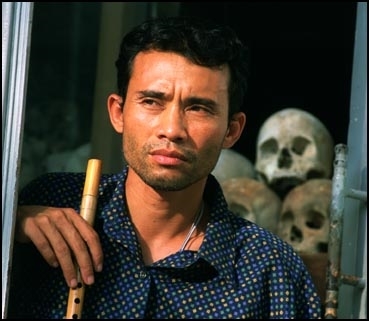 |
| Arn Chorn-Pond at the Killing Fields Museum of Cambodia (facinghistory.org) |
Because his childhood was filled with music, Pond later on in life developed a passion for the musical arts and to this day still works to restore the old, classical music of Cambodia. Music, among many other cultural aspects, in Cambodia was nearly eradicated when the Khmer Rouge massacred the majority of musicians. According to the article "Friends Without A Border's Gala Honors Cambodian Genocide Refugee and Peace Activist", published by PR Newswire: ".90 percent of the artists and musicians alive in Cambodia in the 1970s were targeted for murder. Back then, it was his ability to play the flute that helped keep Chorn-Pond alive. Today, he says, Cambodian children enter a world that would have no music unless efforts were made to preserve it. That's the mission of Cambodian Living Arts, an organization he founded in 1998" (Hest). When the Khmer Rouge gained control over Cambodia during the mid-1970's, Pond was forced to work tireless hours at the tender age of 12 or he would certainly be brutally executed. Pond managed to evade execution by entertaining a group of the Khmer Rouge guards in his prison camp using his extraordinary talent as a flautist. Pond's survival was entirely dependent on a small shaft of a wood that happened to create sounds that he would love as an adult. Pond emphasizes that if no "efforts were made to preserve" Cambodian music, then it would disappear with the musicians that left the world because of the Khmer Rouge. His passion for music led him to begin the Cambodian Living Arts, an organization dedicated to reviving the Cambodian arts that were lost due to the Khmer Rouge. Pond's dedication to his organization is made possible by his love for music. His passion for music is furthermore shown when he admits that: ". his greatest pleasure, he says, is finding and nurturing young musicians who are reclaiming a part of his homeland's heritage" (Kahn). Most humans would imagine musicians as those who are famous due to their musical talents and use these talents to earn a profit. Arn Chorn-Pond however, finds the most joy in finding other musicians and their talents. Because music was the sole beacon of light in his otherwise dreadful childhood, Pond currently feels that children living in Cambodia should have the ability to experience the wonders of music. He admits that his efforts are only made conceivable by the next generation of Cambodians who share his love of music and culture. Arn Chorn-Pond's love for music and dedication to reviving his country's music shows how much of a hero he is. Without Pond's efforts it is almost guaranteed that Cambodia's music would be washed away in the blood of all the musicians murdered during the regime of the Khmer Rouge.
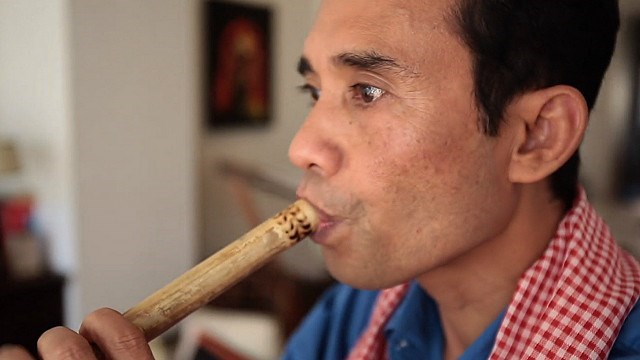 |
| Chorn-Pond played the flute to escape death in Khmer Rouge labor camp(bbc.co.uk) |
"How few there are who have courage enough to own their faults, or resolution enough to mend them." This quote by Benjamin Franklin is what truly separates a hero from the average man. Nobody is perfect, and for one to admit that takes a tremendous amount of confidence in oneself. When Arn Chorn-Pond escaped Cambodia and traveled to America, he faced a predicament that seemed just as intractable as the Khmer Rouge. School. His entrance to American schooling seemed worse than execution: "Cruelly teased by schoolmates for his mannerisms and skin color, he describes the trouble he had controlling his pent-up anger, to the point where he considered running away from his adopted home or killing himself. Only in 1984, when he began to speak publicly about his experiences, including fighting alongside the Khmer Rouge and committing atrocities of his own, did Chorn-Pond begin to heal" (Kahn). It is common for war survivors or veterans to become haunted by their past because of the traumatizing events they witnessed or committed during the war. Pond is no exception to this rule, and because he committed some savage acts while under the regime of the Khmer Rouge, even murder, he was left with violent scars that affected him when he escaped Cambodia and traveled to America. This caused him to act recklessly against other children who teased him, at one point resorting to physical violence with one of the other child survivors who traveled with Pond to America. The boy accused Pond of being part of the Khmer Rouge because the boy witnessed Pond shooting another person. Pond may have learned how to survive in the face of death, but he hadn't confronted his own forced participation in the bloodshed and had not faced racial prejudice and bullying from his peers. But what separated Pond is that he had the bravery to tell his story to the world, including his wrongdoings and regrets. Pond's ability to express his suffering with others gave him the strength to recover from his past wounds. As his story became more well known, he was asked several questions about his experiences from Cambodia. One of them questioned of how he was able to survive emotionally in the United States, and he replied: "When I first got to America, I was very confused, sad and angry. Finally, I was able... to communicate how I was feeling inside and even able to give my first speech about my life to a small church where I got a lot of support emotionally. It was the first time that I knew that Americans would care about what I went through... Sharing my story and the horrible experience I went through with my family and my people, to as many people as I can, is always keeping me from going insane" (Pond). The most difficult part about a mistake or fault is admitting that one has a fault in the first place. Pond was brave enough to be willing to state that he was "very confused, sad and angry". He explains that once he expressed his grim past he was able to push himself away from insanity. Pond's bravest act was not risking his life to save others, but admitting that he was not the ideal perfect human. Heroes are often represented as perfect human beings, and by expressing his faults and fears Pond proves that he is a hero to be admired, as he inspires others in showing that anybody can be a hero.
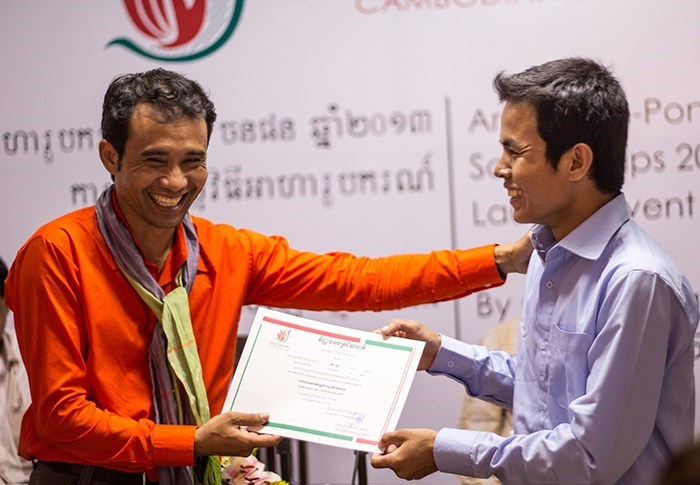 |
| Arn Chorn-Pond awarding a Living Arts Scholarship (globalgiving.org) |
To be a hero one must value others over themselves, show that they have something in life that they love, and show that they have faults just like every other person. Arn Chorn-Pond, a boy that survived death itself and a man who resurrected a lost culture, is truly an inspiration to all. Pond's selflessness shows that a hero has to always think about others first. His love and passion for the musical arts is clearly showed by the amount of dedication and effort he has put into his many organizations which strive to restore the musical talents destroyed by the onslaught of the Khmer Rouge. Pond's love for music is an inspiration to others and shows that they should always pursue something that they love. But most importantly, his ability to speak about his mournful past shows that the past does not define one's fate and one needs to move past his or her own mistakes in order to thrive in the world. Heroes are often believed to be invincible figures that have perfect ideals. But Pond's character shows that heroes, although still extraordinary people, do have faults just like every other person, which inspires us all to attempt heroic acts. To this day he continues to share his past and make sure that all humans know the importance of culture and the need to combat the evils in the world. Anybody could be a hero like Arn Chorn-Pond. It's whether or not they decide to do what's right, pursue their passions, and admit that they can be wrong that decides a true hero.
Works Cited
Chorn-Pond, Arn. "Ask Arn Chorn-Pond." PBS. PBS, n.d. Web. 21 Mar. 2014.
Hest, Christopher. "Friends Without A Border's Gala Honors Cambodian Genocide Refugee and Peace Activist." PR Newswire 4 Apr. 2012. Biography in Context. Web. 21 Mar. 2014.
Kahn, Joseph P. "Cambodian Brings Story of Genocide to Younger Audience." BostonGlobe.com. BOSTON GLOBE MEDIA PARTNERS, LLC, 8 Nov. 2012. Web. 21 Mar. 2014.
Page created on 8/15/2015 10:01:52 AM
Last edited 1/6/2017 7:07:35 PM
